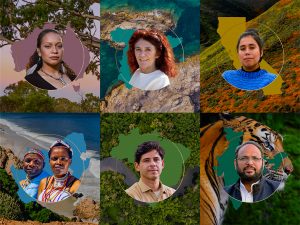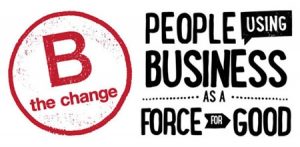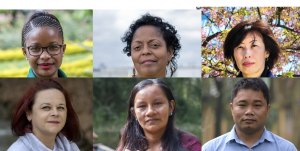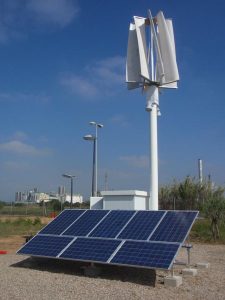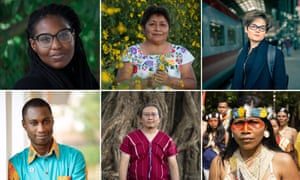The Goldman Environmental Prize is the world’s largest and most prestigious annual award for grassroots environmentalists. Many people refer to it as the “green Nobel.” Goldman Prize winners are models of courage, and their stories are powerful and truly inspiring. “The Prize recognizes individuals for sustained and significant efforts to protect and enhance the natural environment, often at great personal risk. Each winner receives a financial award. The Goldman Prize views ‘grassroots’ leaders as those involved in local efforts, where positive change is created through community or citizen participation in the issues that affect them. Through recognizing these individual leaders, the Prize seeks to inspire other ordinary people to take extraordinary actions to protect the natural world.” Over the 35 years that the Prize has been awarded, there have been more than 220 recipients of the prize.
This year’s prize recipients (representing each of the six inhabited continental regions of the world) are:
- Andrea Vidaurre—USA: “Andrea Vidaurre’s grassroots leadership persuaded the California Air Resources Board to adopt, in the spring of 2023, two historic transportation regulations that significantly limit trucking and rail emissions. The new regulations—the In-Use Locomotive Rule and the California Advanced Clean Fleets Rule—include the nation’s first emission rule for trains and a path to 100% zero emissions for freight truck sales by 2036. The groundbreaking regulations—a product of Andrea’s policy work and community organizing—will substantially improve air quality for millions of Californians while accelerating the country’s transition to zero-emission vehicles.” (Support/follow: The People’s Collective for Environmental Justice, and Moving Forward Network)
- Marcel Gomes—Brazil: “Marcel Gomes coordinated a complex, international campaign that directly linked beef from JBS, the world’s largest meatpacking company, to illegal deforestation in Brazil’s most threatened ecosystems. Armed with detailed evidence from his breakthrough investigative report, Marcel and Repórter Brasil worked with partners to pressure global retailers to stop selling the illegally sourced meat, leading six major European supermarket chains in Belgium, France, the Netherlands, and the United Kingdom to indefinitely halt the sale of JBS products in December 2021.” (Support/follow: Mighty Earth, AidEnvironment, Environmental Investigation Agency, and Repórter Brazil; and please sign this petition.)
- Teresa Vicente—Spain: “Teresa Vicente led a historic, grassroots campaign to save the Mar Menor ecosystem—Europe’s largest saltwater lagoon—from collapse, resulting in the passage of a new law in September 2022 granting the lagoon unique legal rights. Considered to be the most important saltwater coastal lagoon in the western Mediterranean, the once pristine waters of the Mar Menor had become polluted due to mining, rampant development of urban and tourist infrastructure, and, in recent years, intensive agriculture and livestock farming.”
- Alok Shukla—India: “Alok Shukla led a successful community campaign that saved 445,000 acres of biodiversity-rich forests from 21 planned coal mines in the central Indian state of Chhattisgarh. In July 2022, the government canceled the 21 proposed coal mines in Hasdeo Aranya, whose pristine forests—popularly known as the lungs of Chhattisgarh—are one of the largest intact forest areas in India.” (On Twitter, follow @SHasdeo and @CBARaipur)
- Sinegugu Zukulu and Nonhle Mbuthuma—South Africa: “In September 2022, Indigenous activists Nonhle Mbuthuma and Sinegugu Zukulu stopped destructive seismic testing for oil and gas off South Africa’s Eastern Cape, in an area known as the Wild Coast. Organizing their community, Nonhle and Sinegugu secured their victory by asserting the rights of the local community to protect their marine environment. By halting oil and gas exploration in a particularly biodiverse area, they protected migratory whales, dolphins, and other wildlife from the harmful effects of seismic testing.” (Follow/support: Sustaining the Wild Coast, South African National Biodiversity Institute, Amadiba Crisis Committee, and Alternative Information and Development Centre)
- Murrawah Maroochy Johnson—Australia: “Murrawah Maroochy Johnson blocked development of the Waratah coal mine, which would have accelerated climate change in Queensland, destroyed the nearly 20,000-acre Bimblebox Nature Refuge, added 1.58 billion tons of CO2 to the atmosphere over its lifetime, and threatened Indigenous rights and culture. Murrawah’s case, which overcame a 2023 appeal, set a precedent that enables other First Nations people to challenge coal projects by linking climate change to human and Indigenous rights.” (Support/follow: Youth Verdict)
Click on each recipient’s name to read a longer profile—or watch a brief video—about their remarkable efforts and achievements.
Posts on Goldman Prize winners from previous years:
- Goldman Prize Winners, 2023
- Goldman Prize Winners, 2022
- Goldman Prize Winners, 2021
- Goldman Prize Winners, 2020
- Goldman Prize Winners, 2019
- Goldman Prize Winners, 2018
- Goldman Prize Winners, 2017
- Goldman Prize Winners, 2016
- Goldman Prize Winners, 2015
- Goldman Prize Winners, 2014
- Goldman Prize Winners, 2013
- Goldman Prize Winners, 2012
- Goldman Prize Winners, 2011
- Goldman Prize Winners, 2010
